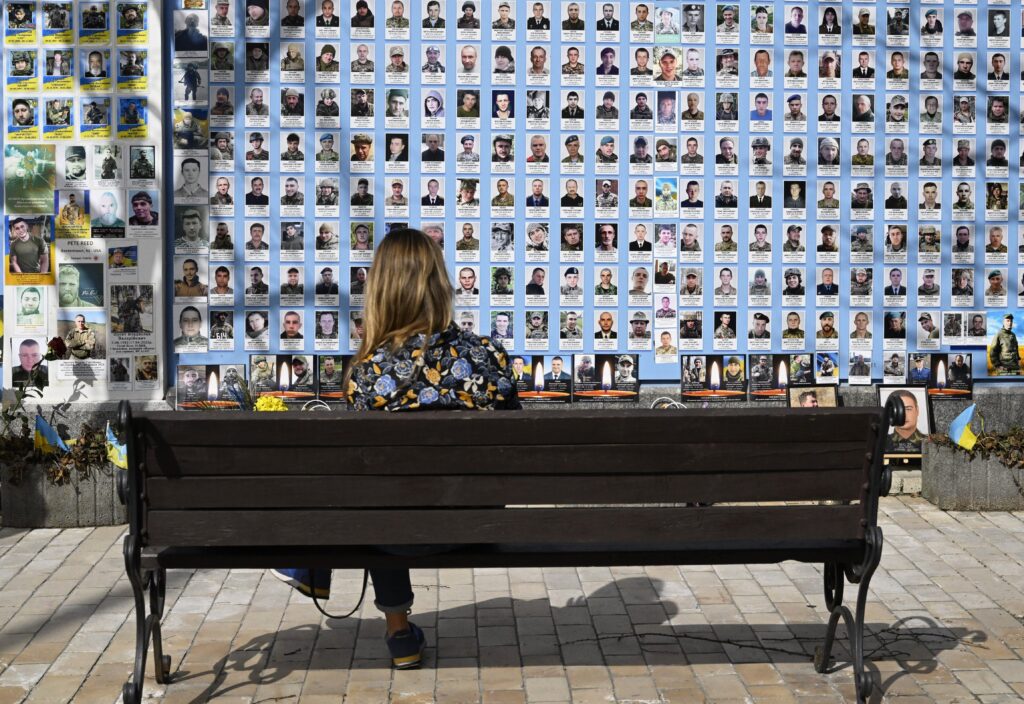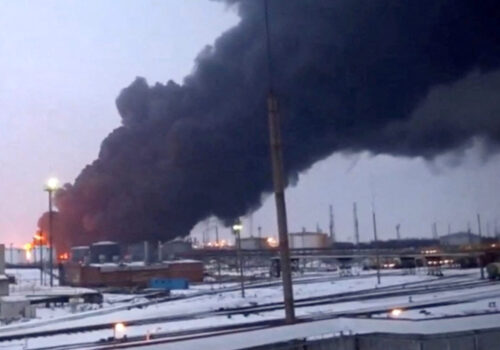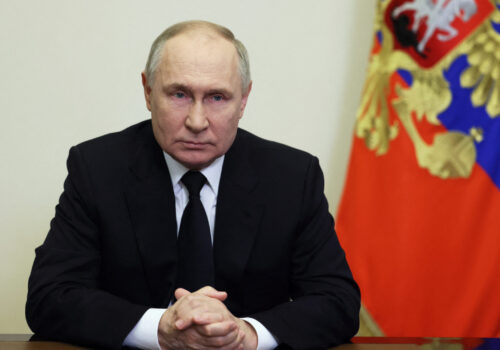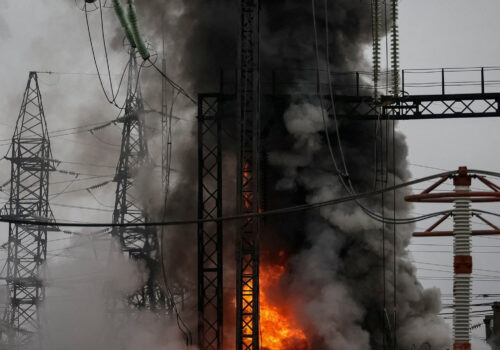Does the West actually want Ukraine to defeat Russia? That is the question many in Kyiv are now asking amid continued signs of Western indecision as the biggest European invasion since World War II approaches its third summer with no end in sight.
The mounting sense of frustration among Ukrainians is easy to understand. Encouraged by delays in military aid for Ukraine, Russia has intensified the bombing of Ukraine’s civilian infrastructure over the past month, plunging entire cities into darkness and leaving millions without access to electricity, heating, water, or internet. Despite the looming prospect of a humanitarian catastrophe, the Western response has been notably lacking in urgency.
Meanwhile, Ukraine has begun striking back with drone attacks on Russian refineries, and has succeeded in disrupting more than ten percent of Russian refining capacity. Rather than supporting this seemingly effective campaign to weaken Putin’s war machine, The US has reportedly called on Kyiv to end its drone strikes due to concerns over global oil prices and possible retaliation. Viewed from Ukraine, these do not look like the actions of partners who are fully committed to Ukrainian victory.
Stay updated
As the world watches the Russian invasion of Ukraine unfold, UkraineAlert delivers the best Atlantic Council expert insight and analysis on Ukraine twice a week directly to your inbox.
Over the past two years, Ukrainians have grown accustomed to excessive Western caution and insufficient Western support. While the democratic world deserves considerable credit for delivering the weapons that have allowed Ukraine to survive, the military aid provided since February 2022 has been subject to frequent delays, and has consistently fallen far short of the quantities required to defeat a military superpower like Russia.
The West’s inadequate response to Russia’s invasion is primarily due to a crippling fear of escalation. Putin sees this indecisiveness and acts accordingly. He easily intimidates Western leaders with nuclear blackmail, while escalating his own attacks on Ukrainian cities and the country’s civilian infrastructure.
In March 2024 alone, Russia attacked Ukraine with 264 missiles and 515 drones, according to Ukrainian Air Force data. Some were intercepted by Ukrainian air defenses, but ammunition is rapidly running out. With no clear idea of when the next batches of interceptor missiles may arrive, Ukrainian troops must ration supplies, leaving millions vulnerable to the horrors of Russian bombardment.
The situation on the front lines of the war is equally critical. With half of promised weapons deliveries arriving late and vital US military aid held up in Congress for the past eight months, Ukrainian troops are running short of crucial ammunition and are currently in danger of being overwhelmed by Russian firepower. In late March, President Zelenskyy admitted that if US aid is not forthcoming, Ukraine will be forced to retreat. If that happens, he warned, Russia could break through Ukraine’s defensive lines and attempt to seize the country’s biggest cities.
Despite this deteriorating picture, there is currently a surreal sense of business as usual in much of the West. The political classes are increasingly preoccupied with upcoming elections and appear largely unaware of the geopolitical disaster unfolding on Europe’s eastern frontier. Many seem to think Ukrainian courage alone will be enough to hold Russia back until the invasion runs out of steam. This is wishful thinking. In reality, if Ukraine does not urgently receive increased support, there is a very real chance that Putin will win. And if Putin wins in Ukraine, he will go further.
Eurasia Center events

At present, the West appears content to wage of a slow war of attrition while drip-feeding Ukraine minimal supplies. This is a recipe for defeat. Russia enjoys huge advantages in terms of manpower and weapons, while the Kremlin has successfully shifted the entire Russian economy onto a war footing. Putin clearly believes he can outlast the West in Ukraine, and is confident time is on his side.
This does not mean a Ukrainian victory is unachievable, but Ukraine’s partners need to demonstrate far more resolve if they genuinely hope to secure Putin’s defeat. Ukraine’s long-range drone attacks on Russian refineries have exposed the vulnerability of Russia’s economically crucial energy industry, but the Western response has so far been predictably cautious. This needs to change. Ukraine cannot win a war against such a powerful enemy with one hand tied behind its back.
Likewise, Ukraine’s remarkable success in the Battle of the Black Sea debunks notions of Russian red lines and offers a road map toward victory over the Kremlin. Despite not having a conventional navy of its own, Ukraine has used drones and missile strikes to sink around a quarter of the Russian Black Sea Fleet. This has forced Putin to quietly withdraw the bulk of his remaining warships from Crimea.
Similar success is possible on land if Ukraine’s Western partners give the country the tools it needs. Ukraine’s requirements are already well known; the Ukrainian military needs vast quantities of artillery shells and drones along with increased deliveries of armored vehicles, combat aircraft, air defense systems, electronic warfare technologies, and long-range missiles.
Without this military aid, Ukraine’s prospects look grim. Nor would the consequences of a Russian victory be confined to Ukraine alone. On the contrary, the shock waves would be felt around the world as Putin and his fellow autocrats sought to capitalize on Western weakness.
A triumphant Putin would almost certainly look to build on the considerable geopolitical momentum created by success in Ukraine. In practical terms, this would mean expanding his quest to reverse the verdict of 1991 and reclaim “historically Russian lands.” Putin’s revisionist agenda would place more than a dozen independent states that formerly belonged to the Russian Empire at risk of suffering the same fate as Ukraine. The most probable initial targets would include Moldova, Georgia, Belarus, and Kazakhstan, but his ambitions would likely expand further.
The fall of Ukraine would leave NATO demoralized and discredited, creating a once-in-a-lifetime opportunity for the Russian dictator to achieve his ultimate goal and instigate the break-up of the alliance. NATO leaders have already demonstrated that they are afraid of escalation and inclined to back down when confronted by the Kremlin. In a post-Ukraine environment, Putin may look to exploit this lack of resolve by testing NATO’s own red lines while stopping short of full-scale hostilities. If the alliance failed to rise to this challenge, it would risk losing all credibility overnight. While NATO could technically survive such a crisis, the alliance would struggle to maintain any legitimacy without its cast-iron commitment to collective security.
Fellow authoritarian powers like China and Iran are also watching the West’s weakness in Ukraine and are drawing the obvious conclusions. This is already helping to fuel insecurity in the Middle East and increasing the threat to Taiwan. The global security architecture established over the past eighty years is clearly crumbling, and Ukraine is the front line in the fight to shape the future of international relations.
The West’s fear of escalation is Vladimir Putin’s secret weapon. It has deterred Western leaders from arming Ukraine, and has prolonged the war by preventing the Ukrainian army from building on its early battlefield successes. Unless the West can overcome this self-defeating fear, it may ultimately lead to Russian victory.
Russian success in Ukraine would almost certainly set the stage for a far bigger military confrontation between the Kremlin and the democratic world. Since February 2022, Putin has placed his entire country on a war footing and has positioned Russia as the leader of an anti-Western coalition of authoritarian states aiming to transform the world order. As the invasion of Ukraine has escalated, he has become increasingly open about his own imperial ambitions. It is dangerously delusional to suggest Putin will simply stop if he wins in Ukraine. Instead, Western leaders must decide whether they would rather arm Ukraine for victory today, or find themselves confronted with a resurgent and emboldened Russia tomorrow.
Oleksiy Goncharenko is a Ukrainian member of parliament with the European Solidarity party.
Further reading
The views expressed in UkraineAlert are solely those of the authors and do not necessarily reflect the views of the Atlantic Council, its staff, or its supporters.

The Eurasia Center’s mission is to enhance transatlantic cooperation in promoting stability, democratic values and prosperity in Eurasia, from Eastern Europe and Turkey in the West to the Caucasus, Russia and Central Asia in the East.
Follow us on social media
and support our work
Image: Pictures and flowers at the Memory Wall of Fallen Defenders of Ukraine in Kyiv, Ukraine on April 2, 2024 amid the Russian invasion of Ukraine. (Photo by VESA MOILANEN/LEHTIKUVA/Sipa USA)




